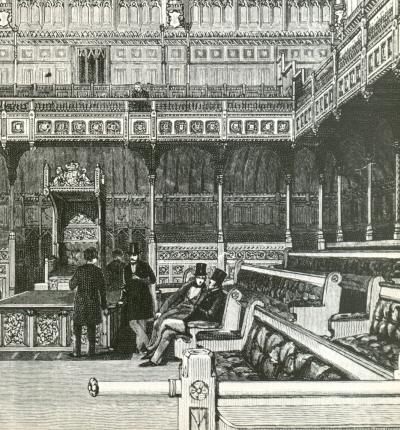
Edward Winter
(2003, with additions)

Page 485 of issue 32 of Les Cahiers de l’Echiquier Français published a short game lost by a future British Prime Minister, Ramsay MacDonald (1866-1937):
John D. Chambers – Ramsay MacDonald
Lossiemouth, 1891
Scotch Game
The only information about the source is that the game was published in the Falkirk Herald in 1923.
(Kingpin, 2001)
In C.N. 2773 Alan McGowan (Glasgow) reported that the game had appeared in the Falkirk Herald of 24 January 1923, having been submitted by J.D. Chambers.
We now turn to an earlier British Prime Minister, William Gladstone, with an extract from page 37 of Catherine Gladstone (Nisbet & Co. Ltd., London, 1919) the memoir of W.E.G.’s wife, published by their daughter, Mary Drew:
‘… The two delighted in billiards and chess. In the latter Mrs Gladstone must have shown no little skill. The tradition survives that Mr Gladstone beat Mrs Gladstone, that Mrs Gladstone beat Lord Lyttelton, and that Lord Lyttelton beat Mr Gladstone. In the autumn of his marriage year [1839] he remarks: “C. and I in deadly conflict – too great an expenditure, perhaps, of thought and interest” – and this was chess!’
(Kingpin, 2000)
H.H. Asquith, who was the British Prime Minister from 1908 to 1916, had chess as ‘a pronounced hobby’, stated page 66 of the Chess Amateur, December 1908. His interest in the game was also mentioned on page 80 of the April 1915 American Chess Bulletin. The December 1924 BCM (page 495) noted that Stanley Baldwin had been re-elected President of the Worcester Chess Association. ‘We do not know his strength as a player but fear he will not have much time to devote to the game.’
(2614)
We offer some gleanings on what may be regarded, relatively speaking, as the golden period of the House of Commons’ connection with chess, i.e. the half-century from the 1880s to the 1930s. The first passage is from The Scotsman, as quoted on page 78 of the April 1888 International Chess Magazine:
‘Chess has become one of the institutions of the House of Commons. Since the introduction of the board to the smoking-room many stiff games have been fought every night. Gladstonians challenge Unionists, and Parnellites also come within the chess circle. On Tuesday Mr Bradlaugh and Mr Henniker-Heaton were the centre of a group of interested observers, and still stranger conjunctions have often been seen across the board. The players are now becoming fastidious. Two weeks ago they were delighted to have a moveable board; on Tuesday night they were agitating for a fully-equipped table. A petition in regular parliamentary form has been prepared, and to it one hundred signatures have already been attached. In this document the defects of the existing arrangement are gravely enumerated, and the Chief Commissioner of Works is requested to furnish forthwith all that the players desire.’
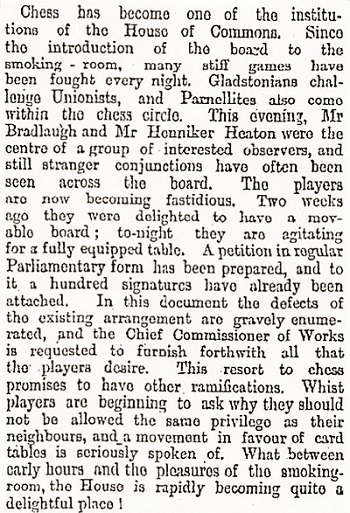
The Scotsman, 29 February 1888, page 7
The next item, from ‘E.A.’ (i.e. Edwyn Anthony) in the Hereford Times, was quoted on pages 491-492 of the December 1890 BCM:
‘The popularity of the game of chess, since its introduction not so long ago into the smoke-room of the House of Commons, has been a constantly increasing quantity – not, indeed, a very surprising fact. Mr Gladstone has stated more than once that the British House of Commons does more work than any other legislative assembly in the world, and, apart from the intrinsic claims of the pastime most akin to science of any in existence, an absorbing recreation like chess must needs be a great help to relieve the tedium of the weary hours of waiting which every member who does his duty by his constituents must necessarily undergo. Lord Randolph Churchill is, we believe, the best player on the Conservative side but, casting our eyes for the moment on the Liberal benches alone, we find that Caissa ranks among her votaries some of the ablest members of the party. Strongest as a chessplayer stands Mr Newnes, the president of the British Chess Club. Next come the following group among whom there is no considerable difference in the strength: Mr Bradlaugh, Colonel Nolan, Sir Julian Goldsmith, Dr Hunter, and Mr Atherley-Jones. And, in close company therewith, we have the well-known and well-honoured names of Sir Charles Russell and Mr Winterbotham. The Speaker, we presume, is a chessplayer, since he is the president of the Leamington Chess Club. Mr Gladstone is acquainted with the moves, but, so far, history fails to record any game played on the checkered field by the greatest player on the political board of ancient or modern times.’
The April 1893 BCM (page 181) quoted from The Million:
‘The only games which are sanctioned or, more correctly speaking, “winked at” in the House of Commons are chess and backgammon. Chess, as the more stately and scientific of these, commands exclusive attention. Backgammon is, by common consent, voted bourgeois, and is tabooed. The chessplayers of distinction, that is to say, those who play upon scientific principles, are Mr George Newnes (who, according to Mr Henniker-Heaton, is the best player in the House), Colonel Nolan, Lord Carmarthen, Mr Bonsor, Mr Bromley Davenport, the Hon. Frank Parker, Mr Bryn Roberts, the Hon. W. Fellowes, and Mr Caleb Wright. As a time-player Mr Henniker-Heaton is the doyen of the Parliamentary chessplayers. When Mr Charles Bradlaugh sat under the fane of St Stephen’s he and the member for Canterbury pitted themselves together. Bradlaugh was a fine strategist, and the two were about equal. It was the cynical humour, however, of the member for Northampton, to take Mr Henniker-Heaton’s bishop, he being a churchman of the most orthodox type, and Mr Bradlaugh not sharing his opponent’s affection for the establishment.
How and when chess entered the House of Commons is not accurately known. Formerly it was played in a very furtive way. A former member for Deptford, Mr Evelyn, left a board behind him, which Mr Henniker-Heaton discovered, and promptly challenged Mr Bradlaugh. Members took so much interest in these tournaments that a “pool” of half-crowns was started, and with the fund a dozen sets of chess were purchased. The chess club at the House now numbers representatives of all the nations, and it is their particular pride to be able to boast of having returned all their men at the General Election.’
Page 234 of the Chess Player’s Chronicle, 14 August 1895 quoted from the Newcastle Daily Journal:
‘Chessplayers in the House regret that in the wreck of the Liberal party several of the best players have gone. Mr Henniker-Heaton, who is himself an accomplished player, is lamenting in mournful numbers the loss of Colonel Nolan and Sir George Newnes, who have lost their seats, and Mr Townsend, the Conservative who has retired – three of the best chessplayers in the old House. But I apprehend among the new members some promising chessplayers may be found, and the old members of that persuasion will still play, to while away the weary time of waiting, in their favourite game.’
Now a report from page 137 of the April 1897 BCM:
‘A parliamentary contest of a highly interesting character took place on 17 March, when seven members of the House of Commons played a match of chess against seven members of the Press Gallery. From the first the MPs led, and finally won in good style by 4½ to 2½.’
The House of Commons was represented by ‘Hon. Horace Plunkett, Mr Parnell, Mr Strauss, Mr Atherley-Jones QC, Mr Cosmo Bonser, Mr Seton-Kerr, Mr McKenna’. The following year (BCM, September 1898, page 369) the House of Commons beat the Press Gallery by 12½-9½.
Below we reproduce a set of photographs from page 580 of Harper’s Weekly, 12 June 1897:

Patsy A. D’Eramo (North East, MD, USA) has provided the two items below:
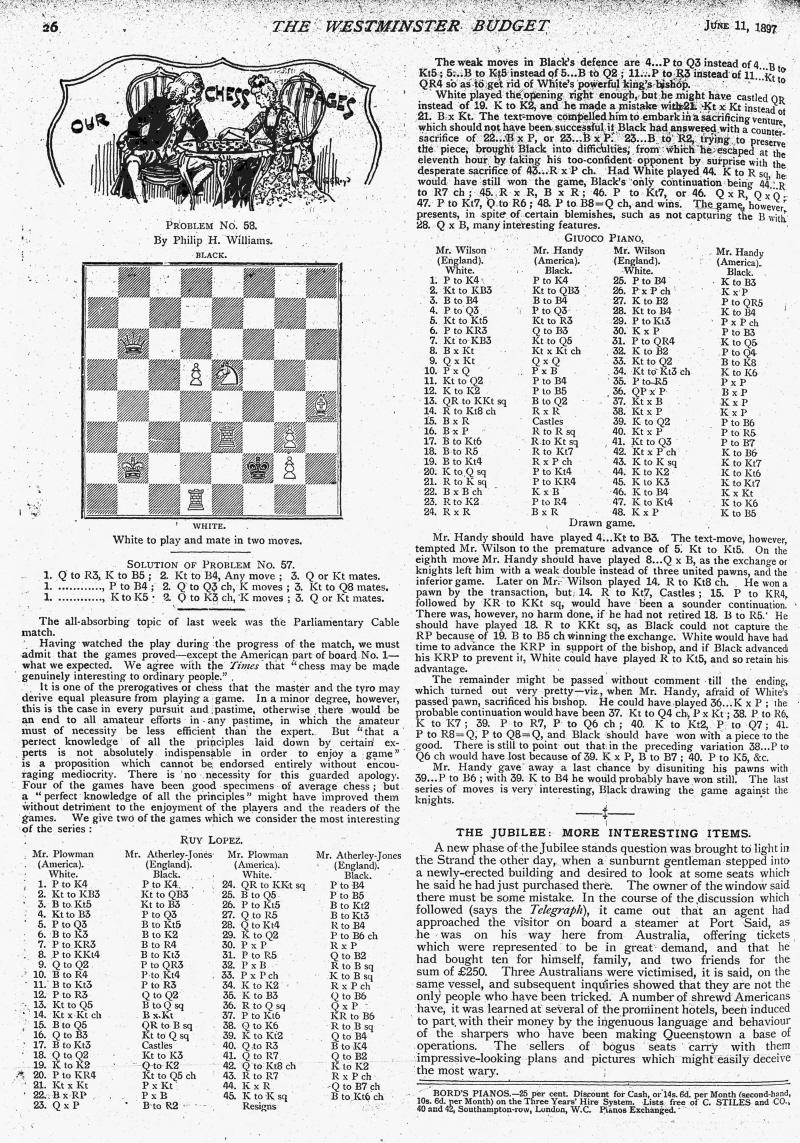
Westminster Budget, 11 June 1897, page 26

San Francisco Chronicle, 12 June 1897, page 11
Page 143 of the August 1897 American Chess Magazine gave a photograph of Henniker-Heaton with a reference to, and brief quote from, his article on the cable match in the Pall Mall Gazette.
Page 139 of the April 1901 BCM had an article by ‘M.J.I.’ entitled ‘The Most Exclusive Chess Club in the World’. An extract follows:
‘Readers of the British Chess Magazine may be interested in some account of the most exclusive chess club in the world, by which I mean that in connection with the Reporters’ Gallery of the House of Commons …
Chess in the House of Commons Gallery used formerly to be played in the smoking room, but since last autumn, when fresh accommodation was given to the journalists, who were getting rather straitened in their old quarters, a small but comfortable room has been assigned to chess. It is high up in the building, looking out upon Palace Yard through a window fashioned with delicate tracery. Newly and admirably furnished, it does every credit to the First Commissioner. Is he a chessplayer himself? Perhaps.
Altogether about 30 members of the Press Gallery employ themselves to a greater or less extent in shifting about the pieces in hours of leisure. The play is somewhat desultory, for the players naturally never quite know when they will be disengaged, and often in the middle of a game the time will come for a “turn” and one of the combatants has, for half-an-hour or so, to listen to and to record the dreary talk of our legislators. They are of all strengths, too, from the average first-class to the men who have queens and more allowed them. One or two play also in London League and similar matches, but for the most part they take their chess, I believe, wholly in the Gallery, where doubtless some of them first learnt the game – perhaps, 30 or 40 years ago, in the case of old stagers. Some little looseness of organization cannot, under the circumstances, be avoided, but there is a regular committee, and handicaps and matches are played throughout each session.’
The next item comes from the Glasgow Herald and was quoted on pages 149-150 of the September 1901 issue of Checkmate:
‘The House of Commons has at least one distinction – it is the place in the world where the greatest amount of time is wasted by the greatest number of presumably intelligent men. … It is the smoking room, however, which is the great resort of idle members, and as, with the rare exception of a game of draughts, chess is the only game indulged in, it is no wonder that it is very popular …
The quality of chess in the House is not of the highest order. In the last Parliament Mr Horace Plunkett was easily first, and indeed he is probably almost, if not quite, a first-class amateur. In the present Parliament the recognized head of the chess circle is Sir George Newnes, who is a fairly strong player, and in the Parliament of 1892-95 played frequently. Although he takes as much interest in the game as ever, and is a very generous patron of it outside, he does not frequently play. Among the other players probably our Scotch member, Mr Bonar Law, is as strong as any of them.’
The Herald then gave brief accounts of the expertise, or lack thereof, of various players, including Reginald McKenna, who was described as ‘undoubtedly one of the rising men on the Liberal side of the House’:
‘He can play a very good game of chess when he chooses but, like many others, he enjoys criticizing better even than playing, and very often some of his best friends would wish him anywhere else when he shows them how easily they could have won the game if they had played such and such a move, instead of playing the move that lost it.’
On page 14 of the January 1903 BCM ‘D.Y.’ gave a more restrained account of chess-playing in the House:
‘Chess in Parliament has always been as much exaggerated, almost, as the story of Mark Twain’s death, thanks to the descriptive writer of the popular magazine, who never minimizes the importance of his subject, lest the editor should return his “copy”. The amount of chess enthusiasm among MPs may be gauged from the fact that although there are two cups for inter-parliamentary contests on view in the smoking-room, one has never been played for, and the other only once some years ago, when a match with the American Legislature ended in a draw. The Parliamentary championship only exists in the fertile imagination of the lobbyist, and for the last three years even the match which used to be played with the gentlemen of the Press has been discontinued.
… The fact is Parliamentary chess is at as low an ebb as it can possibly be. The new rules, which give a long interval for dinner in the best part of the evening, and positively encourage members on the most important nights to go home early, and return late for the division, are much against chessplaying at Westminster, even if the inclination existed. And the two or three members interested in the game are rather patrons of chess than players. There is only one, I think, Mr F. Wilson, who is seen in, say, a county team. The others preside at dinners, or distribute prizes, are generous with subscriptions – fulfil in fact a very useful as well as an ornamental, part in chess life – but they cannot give enthusiasm where it does not exist.’
The next quotation is by P.H. Williams and comes from page 323 of the August 1917 Chess Amateur:
‘Liverpool Post and Mercury London correspondent notes that chess has become an innovation “on the Terrace” of the House of Commons, and the other day an exciting and well-played game was witnessed there between two MPs, who carried a board and pieces from the smoking-room, and played in the open on the Terrace. As is well known, chess and draughts are the only games permissible in the precincts of the House, but it seems to be a novelty to have chess on the Terrace. It shows the supreme contempt with which our legislators regard the “overhead” exhibition of Teutonic “kultur”.’
Shortly after the Great War, the Commons lost much of its chess presence. Page 44 of the February 1919 BCM cited an MP as writing in the Daily Dispatch, ‘The General Election has swept away most of the habitués of the chess-room in the House of Commons’, although he added that ‘the three greatest players, Mr Bonar Law, Sir Watson Rutherford and Captain Barnett, will be found there’.
The same page of the BCM mentioned William Clough of the Bradford Chess Club, the former MP for Skipton. Later that year he was to win a 24-move game against Capablanca in a simultaneous exhibition. We gave the score on page 56 of the 5/1987 New in Chess, taken from page 5 of the Yorkshire Observer of 8 October 1919.
Capablanca’s display (refereed by Amos Burn) in Committee Room No. 14 at the House of Commons on 2 December 1919 is well known. Page 9 of the January 1920 BCM reported:
‘Señor J.R. Capablanca had the honour paid him of being the first chess master to be invited to give a simultaneous performance within the precincts of the House of Commons. The arrangements were carried out by Major R.W. Barnett, MP, who got together a team of 33 past and present members of the House and five of the Press Association.’
After listing the 38 opponents, the BCM remarked:
‘There was a continued stream of visitors from other parts of the House, including Mr Bonar Law, and that he was unable to take a board himself was universally regretted. Mr Austen Chamberlain was also an onlooker for part of the time …’
An item from pages 9-10 of the January 1920 BCM regarding a parliamentary question to Bonar Law (then the Leader of the House) arising from Capablanca’s simultaneous display on 2 December 1919:
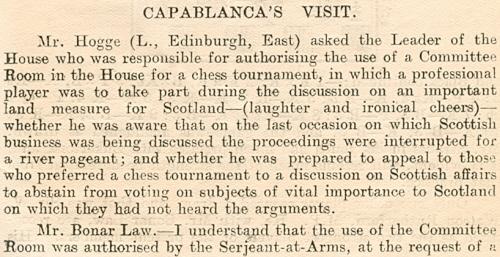
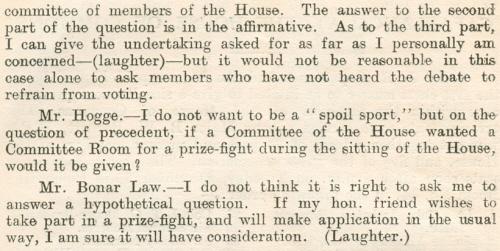
On page 101 of the January 1920 Chess Amateur P.H. Williams commented on the Cuban’s display:
‘One of Señor Capablanca’s great efforts was his contest at the House of Commons in the midst of a strenuous sitting of that august community. Following the prevailing fashion, a well-known ping-pong expert is willing to play a match against all-comers in the Lion House at the Zoological Gardens; a friendly match at spellikins is arranged to take place in the booking office at the Piccadilly Tube Station for the benefit of people returning home from the theatre; a well-known bridge player offers to play 14 dummies simultaneously with a special pack of cards numbering 728, including 182 of each suit. This will take place in the vestibule of the Holborn Stadium during the next boxing boom; a well-known financier will give an exhibition match of “Beggar-my-neighbour” on the floor of the Stock Exchange against all-comers, undertaking to ruin all his opponents, less Tax, in four hours.’
It may be recalled that a game on 29 December 1919 between Capablanca and three Members of Parliament, including Bonar Law, was given on pages 59-61 of Chess and its Stars by B. Harley (Leeds, 1936) and pages 113-114 of The Unknown Capablanca. Neither book suggested that the game was played in the House of Commons, but this conclusion was wrongly drawn by R. Caparrós in the two editions of his book of Capablanca’s games. He also gave the score out of chronological sequence, placing it among the 2 December games despite correctly dating it 29 December.
None of the above-mentioned books named Bonar Law’s allies, but their identities have been on public record for 80 years. Page 447 of the December 1923 BCM quoted Major R.W. Barnett from the Morning Post:
‘On 29 December 1919 the three best players in the House of Commons, Mr Bonar Law, Sir Watson Rutherford and myself, played at my house in consultation against Señor Capablanca. The late J.H. White, of “Griffith and White” fame, carried the moves from one room to another, and some of the shrewdest strokes in the game were suggested by Mr Bonar Law.’
The April 1923 Chess Amateur (page 198) carried a report from the Times Weekly:
‘The election of the new House of Commons made the reconstruction of the House of Commons Chess Circle necessary, and this was carried out at a meeting in Committee Room No. 7. Major Barnett presided, and in reviewing the activities of the Circle last year laid special emphasis on the way every section of the House contributed to the fund for the first prize in the London International Congress …’
From The Times (London), 26 November 1925:
‘The House of Commons Chess Circle played one of their few matches against outside teams in Committee Room No. 16 yesterday afternoon, with the Athenaeum Club for their opponents. The result was a win for the Circle by 5½ games to 2½, and that total would have been increased if Sir John Simon had not by inadvertence thrown away a position where the win was within his grasp.’
Another such match took place on 2 March 1933, when an eight-man team from Cambridge University visited the House of Commons and won +6 –0 =2. Sir John Simon lost again, and we gave the game in our feature article on him. The full result appeared on page 172 of the April 1933 BCM.
Page 2 of the January 1926 BCM reported:
‘Most of the chessplaying members of the House of Commons were present at the dinner given by the Chess Circle to Señor Capablanca on 15 December. The Earl of Plymouth, a keen player, presided …’
The final passage in the present selection concerns a case, possibly unique, of chess being played in the Commons Chamber itself. In 1931 (July issue, page 306) the BCM quoted from ‘the paragraphist in the Evening Standard’:
‘I was glad to observe last night that two Labour members, Mr Benson and Mr Denman, were determined not to be debarred by red tape from having a little quiet fun. Under the very eye of the Speaker they started playing chess. Now chess as a game is the only pastime permitted in the Palace of Westminster. This is the first time, however, that I have seen it played upon the floor of the House. They employed a travelling chess-board of the kind in which little celluloid wedges are inserted into slips. It was a brave show.’
(2947)
C.N. 2947 above quoted a reference to a drawn match between the House of Commons and the ‘American Legislature’. It was played by cable in 1897, and the most detailed account we have seen is the article ‘When Parliament challenged Congress’ by W.C. Kendal on pages 368-370 of the September 1961 CHESS. ‘The rules provided that five boards were to be set up in the House of Commons and five in the House of Representatives. At each of the five boards there was placed opposite each player a representative (“living dummy”) of his opponent.’
At least to modern eyes, the event lacked star names, the US players being Richmond Pearson (North Carolina), T.S. Plowman (Alabama), Robert N. Bodine (Missouri), Levin I. Handy (Delaware) and John F. Shafroth (Colorado), while Great Britain was represented by Horace C. Plunkett, Arthur Strauss, F.W. Wilson, L.A. Atherley-Jones and John H. Parnell.
(2952)
Chris Randall of the House of Commons Information Office in London has sent us an article from pages 189-190 of Lords and Commons of 25 March 1899 entitled ‘Chess in Parliament – A Chat with Mr Henniker-Heaton M.P.’ Below are some of the parliamentarian’s disclosures about the origins of chess in the House:
‘As to chess, somewhere about 1885 I discovered a solitary and decidedly ancient board in the Smoke-room of the House of Commons. It is alleged that there were legislators in the bygone days of the misty past who affected the game, just as it is alleged that a rubber of whist was often played in the rooms of a certain popular Serjeant-at-Arms, whither Members, who were carefully “selected”, brought their own whisky. As far as I can ascertain, however, there is only one survivor of those very exclusive whist parties.
But to return to that time-worn chess-board, from the discovery of which the present flourishing condition and position of the game has been evolved. It was, so I am credibly informed, left behind by a former Member for Deptford. Be this as it may, it was really wonderful how soon we attracted enthusiastic devotees about that antiquated and battered board. The crush of spectators became so great that we resolved to start a 5s. subscription. The idea was immediately successful. We – that is the Chess Committee – increased our stock of boards and sets of men to eight or ten forthwith.’
(2958)
One full game and three positions (none of them particularly colourful) from the transatlantic cable match were presented in the detailed report on pages 1-6 of the American Chess Magazine, June 1897.
(2999)
From page 314 of Emanuel Lasker The Life of a Chess Master by J. Hannak (London, 1959) comes this extract from ‘one of Lasker’s last lectures’, in Chicago:
‘When in England in 1936 I had the most pleasing acquaintance of the Member of Parliament, Brigadier-General Spears. He invited my wife and myself to his house, and he wanted to know what we thought of the Hitler régime ...’
It is not specified whether Lasker met the politician on a chess occasion. We note from page 337 of Who’s Who of British Members of Parliament, volume three (Brighton and Atlantic Highlands, 1979) that Major General Sir Edward Louis Spears, KBE, CB, MC (1886-1974) was a Member of Parliament from 1922 to 1924 (Liberal) and from 1931 to 1945 (Conservative). He adopted the surname Spears, instead of Spiers, in 1918.
(4451)
In C.N. 4203 Lord Morgan presented a tribute to his father, that exceptional chess writer D.J. Morgan (1894-1978), and below we quote a brief chess-related passage from Lord Morgan’s latest book, a biography of Michael Foot. Born in 1913, the British politician was the leader of the Labour Party from 1980 to 1983, and the dust jacket carries a fine quotation by him (from page 489): ‘Men of power have no time to read; yet the men who do not read are unfit for power.’
The chess text appears on pages 109-110 and relates to Foot’s first term in the House of Commons, to which he was elected in 1945:
‘Foot also liked the parliamentary atmosphere, the chatter and conspiracy in smoking room and tea room, the ready access to Fleet Street friends. He enjoyed too some of the extra-mural activities, especially the group of MPs who played chess. Leslie Hale was his favoured opponent. Foot was recognized as being amongst the best parliamentary players, though it was agreed that the strongest was Julius Silverman. Others of note were Douglas Jay, Reginald Paget, Maurice Edelman and Maurice Orbach, with Jim Callaghan another, less talented, enthusiast. The world’s dominant players were Russian, and Foot met several grandmasters when an international tournament was held in London in 1946.’
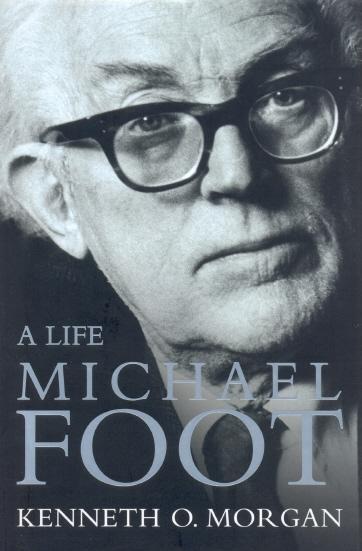
(4907)
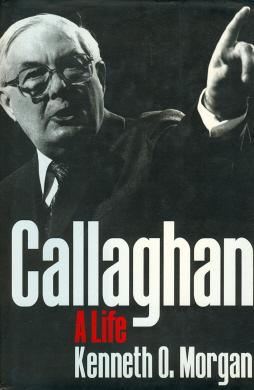
We are grateful to Lord Morgan (Oxford, England) for permission to quote a passage from page 130 of his biography of the former British Prime Minister, Callaghan A Life (Oxford, 1997):
‘... Callaghan’s only hobby in the House, useful for filling in time before trooping through the division lobby, was chess, which he played with colleagues such as Douglas Jay, Reginald Paget and Maurice Edelman. Michael Foot was a more dashing performer, and the backbencher Julius Silverman perhaps the strongest Commons player of all. Callaghan’s chess style was unremarkable: he favoured classic openings ... such as the Ruy López and the Sicilian Defence (though, as for many others, the full subtleties of the latter often eluded him). He admired the proficiency of the leading Russians, the current world champion Mikhail Botvinnik and his successors Smyslov and Tal. It marginally underlined his early enthusiasm for the Soviet Union. He kept up his interest in chess throughout his life, being a regular attender at the Hastings chess congress. He even took part in a simultaneous contest with the then Russian world champion Gary Kasparov in 1993, with inevitably very brief results. A good-humoured loser, Callaghan concluded that more intelligence was required for chess than for politics.’
A note on page 134 refers readers to pages 26-27 of the June 1990 CHESS for Lord Callaghan’s interview with Cathy Forbes. She reproduced it on pages 141-147 of her book Meet the Masters (Brighton, 1994). See also CHESS, April 1993, pages 4-9.
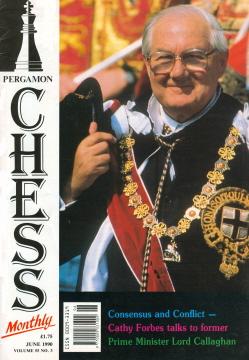
(5191)
Addition on 23 September 2007:
From the Chess Amateur, July 1929, page 219:
‘As a result of the election, the House of Commons has lost some of its best-known and strongest chessplayers, although it may have gained others. The biggest loss is Maj. Sir Richard Barnett, who did not stand for re-election. Mr J.W.W. Hopkins also retired, and has since received a baronetcy. Amongst the “casualties” were Lieut.-Col. Moore-Brabazon and Captain J. Griffyth-Fairfax, who lost their seats; and among those returned were Sir John Simon, Dr Graham Little, and Lieuts.-Cols. Sir P. Richardson and Assheton-Pownall. But each Parliament has its own good chess-circle, in spite of the inevitable changes in its personnel. Major Sir R. Barnett was the strongest chessplayer in the last Parliament, but such men, although lost by Parliament, are by no means lost to chess – rather the reverse, as a rule.’
Addition on 26 December 2007:
From the Chess Player’s Chronicle, 18 October 1890, page 232:
‘Leamington. At the annual meeting, on the 6th, a vote of condolence was passed and forwarded to the family of the late Capt. Gowan, many years President of the Club. The report showed the Club in a prosperous position, with an increased membership. It was decided to ask the Speaker of the House of Commons to accept the Presidency of the Club. This he subsequently did, saying that as a qualified chessplayer he was hardly warranted in accepting the office, but he did so with pleasure. Signor Aspa was elected Vice-President.’
Addition on 21 September 2008:
From CHESS, 14 November 1937, page 79:
‘When the structural and decorative alterations in the House of Commons were planned it was proposed to move the chess room. But the Commons chessplayers, headed by Sir John Simon, are a resolute and influential body; they insisted that their new room should remain close to the dining-room and smoke-room and it is so. The dining-room accommodation has even been reduced a little to oblige the chessplayers, whose room is now beautiful and attractive.
Chess remains the only official game. Billiardists who have been agitating for years still seem to be missing their cue.’
Wanted: a proper source for an observation commonly attributed to Sir Henry Campbell-Bannerman (1836-1908): ‘Chess is not a game but a disease.’
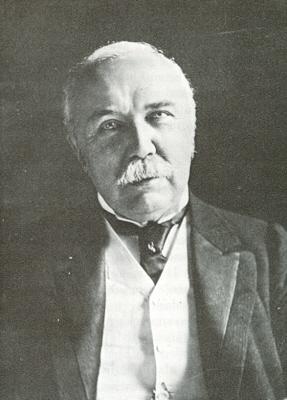
Sir Henry Campbell-Bannerman
The above photograph appeared on page 132 of A Prime Minister on Prime Ministers by Harold Wilson (London, 1977).
(6070)
Following the death of Sir Clement Freud on 15 April 2009, we reproduce a photograph from page 121 of CHESS, January 1973:
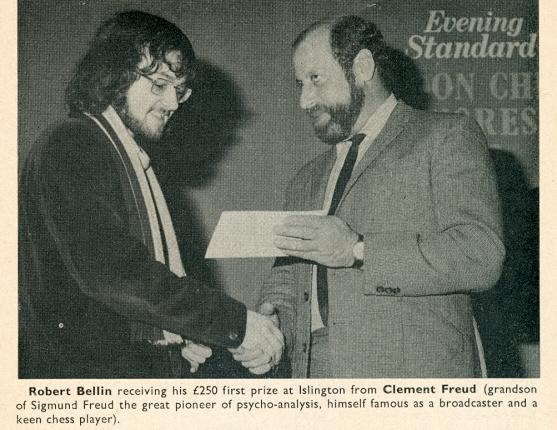
(6081)
See also C.N.s 7659, 7668 and 10672.
C.N. 6070 requested a proper source for the remark ascribed to Sir Henry Campbell-Bannerman, ‘Chess is not a game but a disease’. We now see that on page 184 of the July 1957 BCM D.J. Morgan mentioned a passage on page 57 of volume two of The Life of The Right Hon. Sir Henry Campbell-Bannerman, G.C.B. by J.A. Spender (London, 1923). It was the final paragraph of ‘certain reminiscences supplied by Mr Henry Higgs’:

(6241)
Addition on 19 June 2010:
From pages 31-32 of volume two of Life of The Right Honourable William Edward Forster by T. Wemyss Reid (London, 1888):
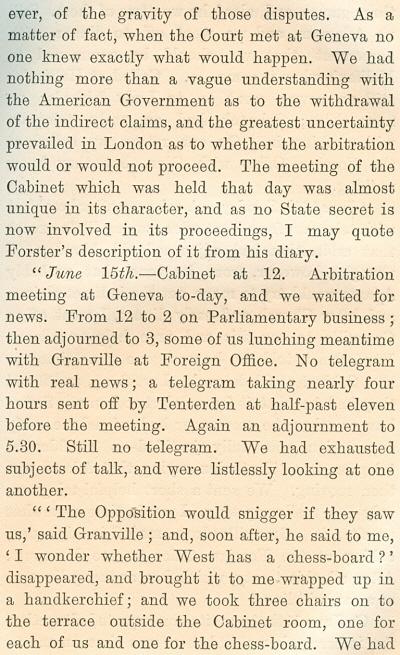
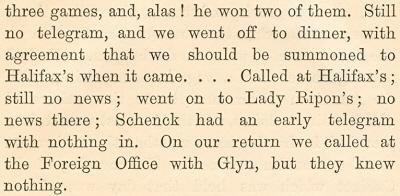
The episode (which occurred in 1872) received 20 lines on page 300 of the October 1888 International Chess Magazine, courtesy of the Manchester Evening News.
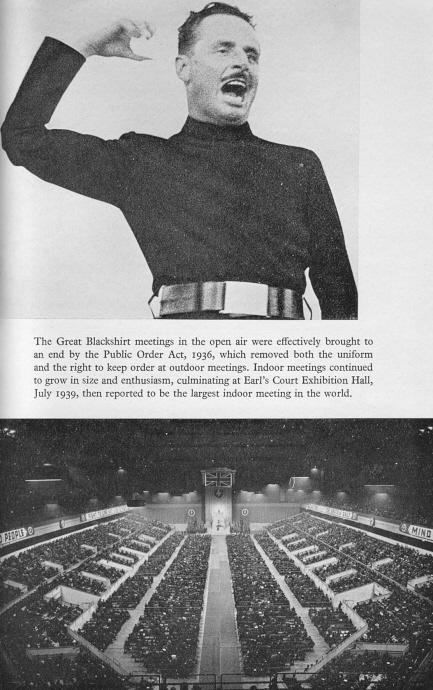
Against which (former) Prime Minister did this political leader play chess? (A clue is available in our feature article Chess Journalism and Ethics.)
(6914)
The Prime Minister against whom Oswald Mosley played chess was H.H. Asquith. From pages 94-95 of Mosley’s book My Life (London, 1968):
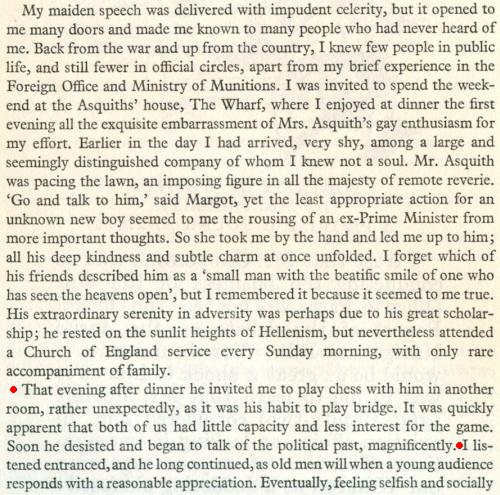
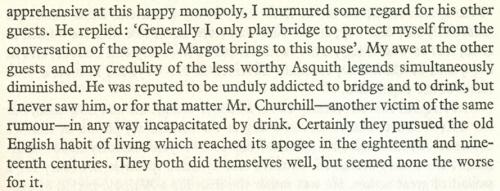
(6920)
From page 105 of CHESS, 14 November 1938:
‘... Neville Chamberlain has accepted the Presidency of the Warwickshire Chess Association, though he has never played a game of chess in his life.’
A further distinction came 50 years later when he appeared on the front cover of the Special Munich Agreement Anniversary Issue (‘piece play for our time’) of a chess magazine.
(7465)
Addition on 15 January 2012:
An extract from reports on pages 226-227 of the Chess Amateur, May 1922:
‘The House of Commons Chess Circle has now been constituted a permanent body with Major R.W. Barnett MP President, Sidney Robinson, Esq. as Hon. Treasurer and Lieut.-Col. Assheton Pownall as Hon. Secretary, and a most distinguished membership. The Circle desired to be definitely associated with the Federation, and the Executive Committee unanimously resolved that a proposal to welcome the Circle as an Honorary Constituent of the Federation with the privileges and representation of a Unit, be at once submitted to the Council. The adoption of this proposal would add to the Council most influential members, the Right Hon. A. Bonar Law, Sir John S. Randles, Sir W. Watson Rutherford and Major A.C. Farquharson, and to both Council and Executive Committee, Lieut.-Col. Assheton Pownall and Sidney Robinson, Esq.’
Page 88 of Najdorf x Najdorf by Liliana Najdorf (Buenos Aires, 1999) has a set of claims purportedly made by M. Najdorf about his over-the-board encounters:

Can corroboration of any authoritative kind be found for, in particular, the assertion that Najdorf played against Churchill in a simultaneous display?
(7689)
Page 49 of the Westminster Papers, 1 July 1876 commented on ‘the passage of arms between Mr Kay Shuttleworth and Mr Gathorne Hardy’:
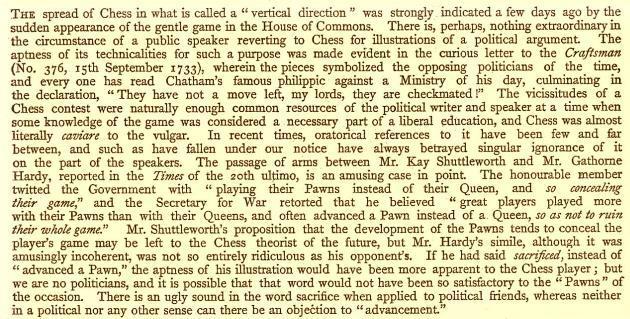
A game played at the St George’s Chess Club and published on page 79 of the Chess Player’s Chronicle, 1850:
Christopher Rice Mansel Talbot – H.G. Cattley
London, 1850
Petroff Defence
1 e4 e5 2 Nf3 Nf6 3 Nc3 Bc5 4 Bc4 d6 5 d3 h6 6 Be3 Bb6 7 Qd2 Bg4 8 h3 Bxf3 9 gxf3 Nbd7 10 O-O-O a6 11 d4 exd4 12 Bxd4 Bxd4 13 Qxd4 Ne5 14 f4 Nxc4 15 Qxc4 b5 16 Qc6+ Nd7 17 Nd5 O-O 18 Rhg1 Nf6 19 Qc3 Kh7
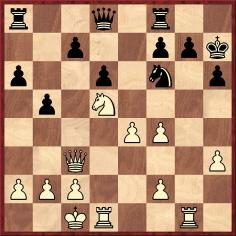
20 Rxg7+ Kxg7 21 Rg1+ Kh8 22 Nxf6 c5

23 Rg7 Kxg7 and White mates in three moves.
This was one of two wins by Talbot which were given on pages 73-74 of the February 1890 BCM following his death, and a note after 19...Kh7 included the remark ‘The mate now administered is a gem of the first water, and worthy of the greatest players’. The same issue (pages 46-47) reproduced Talbot’s obituary from The Times of 18 January, together with a note on his chess activity by William Wayte. In The Times the following observations had appeared:
‘Mr Talbot has gained the honour of being Father of the House of Commons after an experience which is almost unprecedented, for he has sat for the same constituency for no less than 59 years. His mother, Lady Mary, after his father’s death married Sir Christopher Coles, who was returned in 1820 for the county of Glamorgan. Sir Christopher kept the seat till 1830, when Mr Talbot himself stood as a Liberal, and was returned for the seat which he had ever since held. That Mr Talbot’s voice was never heard in the House of Commons is the more remarkable, because he was in point of fact a clever and ready speaker.’
Page 290 of the August 1882 BCM mentioned regarding Talbot’s political career that he was ‘the only member who dates from the unreformed Parliament’. The game against Cattley was also given on page 281 of the July 1898 BCM (with the artistic enhancement 22...b4).
(8096)
From CHESS, November 1971, page 37:
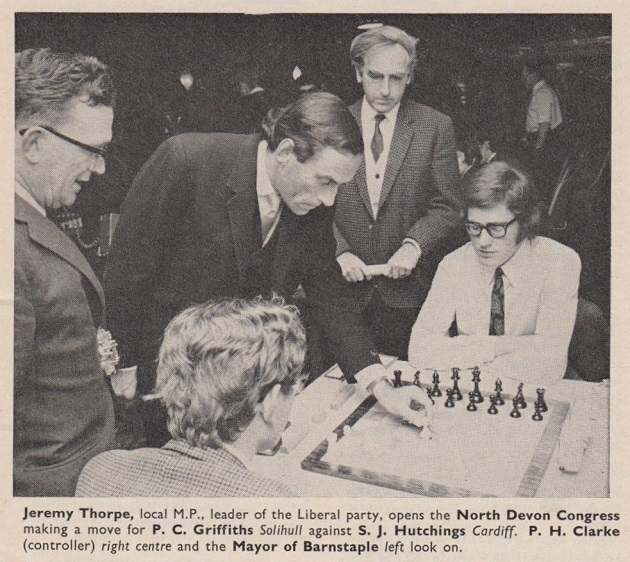
Both Jeremy Thorpe and Peter Clarke died in December 2014.
(9024)
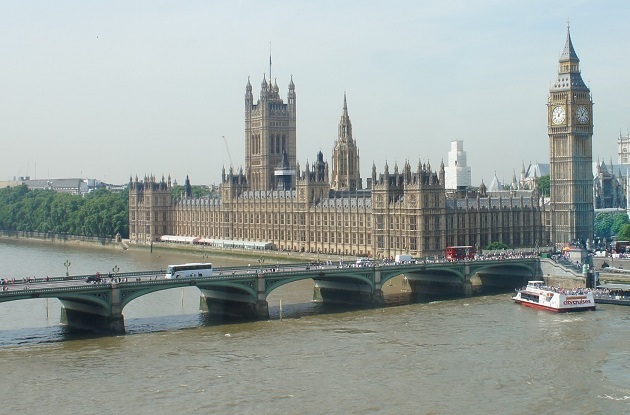
From page 7 of the 10 May 1927 edition of the Manchester Guardian:
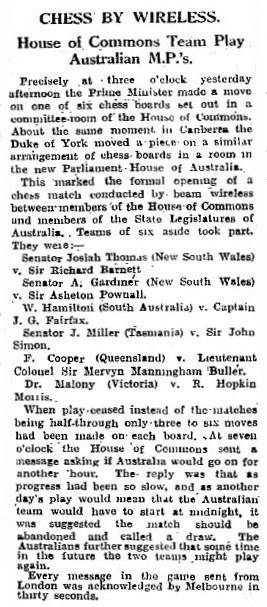
There was a detailed report on pages 253-254 of the June 1927 BCM. So far we have found no apposite pictures of either the Prime Minister (Stanley Baldwin) or the Duke of York (the future King George VI).
(9264)
Pages 686-687 of the November 1926 BCM had this report on preparations for the event:
‘Among the celebrations accompanying the opening of the new Parliament House at Canberra will be a chess match by wireless between Australian and British members. The challenge was sent by the Hon. Sir Littleton Groom, Speaker of the Australian House of Representatives, and cordially accepted by the Right Hon. J.H. Whitley, Speaker of the House of Commons. The Amalgamated Wireless Co. of Australia has undertaken to transmit the moves of the six games, providing the British P.O. will operate at this end. Major Sir Richard Barnett, President of the House of Commons Chess Circle, will make all the necessary arrangements for the British team.’
From Steinitz’s Field column, 5 November 1881:
‘The Postmaster-General, Mr Fawcett, paid a visit last Wednesday evening to Simpson’s Divan, of which establishment the right hon. gentleman used to be a frequenter some years ago. As most of our readers will be aware, Mr Fawcett has been unfortunately blind for many years, in consequence of a shooting accident; but we are informed by a former member of the Cambridge University Chess Club, of which society the right hon. gentleman was also a member while resident at Cambridge, that Mr Fawcett can play single games from memory fairly well and correctly through.’
Henry Fawcett (1833-84).
Addition on 14 June 2015 (the full text of an item briefly referred to earlier):
‘Most of the chessplaying members of the House of Commons were present at the Dinner given by the Chess Circle to Señor Capablanca on 15 December. The Earl of Plymouth, a keen player, presided and proposed “The Island of Cuba”, to which Dr Patterson, the Cuban minister, replied. Major Sir Richard Barnett gave the toast of the world’s champion, Señor Capablanca, who in reply referred to the great pleasure it always gave him to visit this country. Dr E. Graham Little, another member of the Imperial Chess Club, proposed the toast of the Chairman.’
Source: BCM, January 1926, page 2.
A lengthy, fulsome obituary of Sir Richard Wheldon Barnett was published on pages 8-11 of the January 1931 BCM.
Books by Philip Gibbs (1877-1962) have a few references to chess, including the passage shown below from page 286 of one of his autobiographical volumes, The Pageant of the Years (London, 1946). The section in question, ‘Crossing the Atlantic’ (pages 284-286), also related his meetings with Maxine (Blossom) Forbes-Robertson, John Galsworthy, Myra Hess, Ernest Shackleton and Clare Sheridan. It gave no dates, but on page 267 Gibbs mentioned that he crossed the Atlantic in 1919, 1920 and 1921.
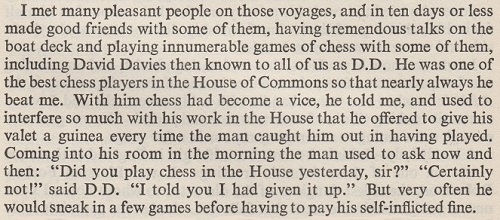
As clarified on pages 359-360, David Davies (1880-1944) was later Lord Davies. Other references to his interest in chess will be appreciated.
From page 8 of Chess for Children by Ted Nottingham, Bob Wade and Al Lawrence (New York, 1993 and 1996):
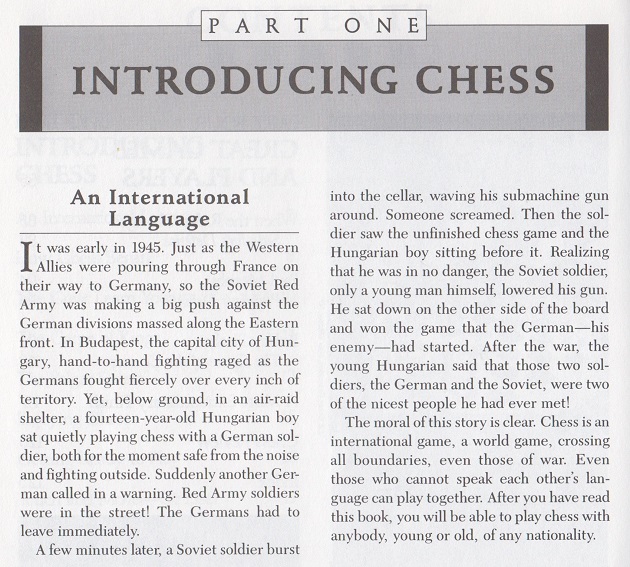
The list of acknowledgements on page 5 included:
‘The late Tom Driberg MP, for “An International Language”, from his report in The Reynolds News, London, 1947.’
Can a reader provide that report? For now, we must make do with Driberg’s text as published on page 168 of King, Queen and Knight by N. Knight and W. Guy (London, 1975):
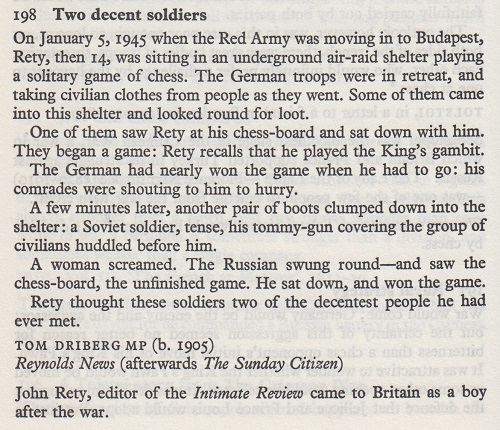
Rety was the translator of Planning in Chess by J. Flesch (London, 1983), named there as ‘John Réti’. Elsewhere, ‘Reti’ and ‘Réty’ are also found.
(11050)
Concerning a match between Oxford/Cambridge and the House of Commons on 24 March 1914, see our feature article on Andrew Bonar Law.
A feature entitled ‘House of Commons Tournament’ was published in Womanhood, 1902, page 209. It gave the conclusion of a game between Atherley-Jones and McKenna.
Page 223 of Womanhood, 1904 reported on a visit by Emanuel Lasker to the Metropolitan Chess Club in London on 6 February 1904. He gave a 20-board simultaneous display:
‘The play was of an exceedingly interesting and sometimes complicated character – so much so that many of the visitors were like the Right Hon. H.H. Asquith MP, who “popped in just for an hour”, could not resist the fascination and remained for several hours.’
Gerard Killoran (Ilkley, England) has come across the following:
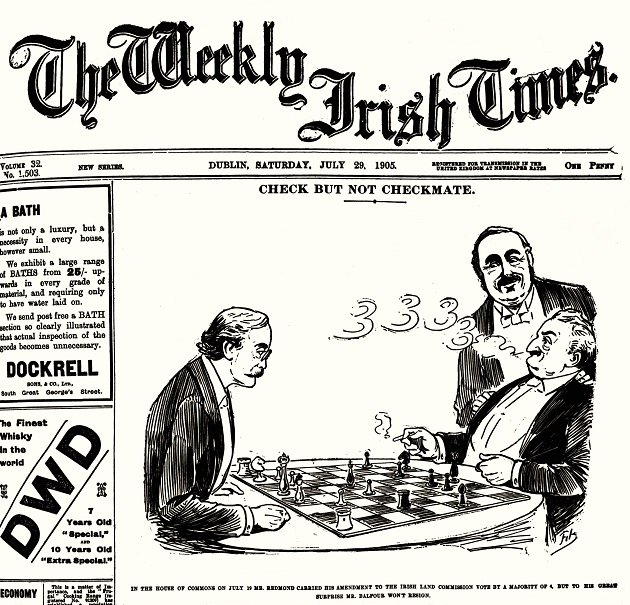
A selection of items concerning the politician and broadcaster Brian Walden (1932-2019):
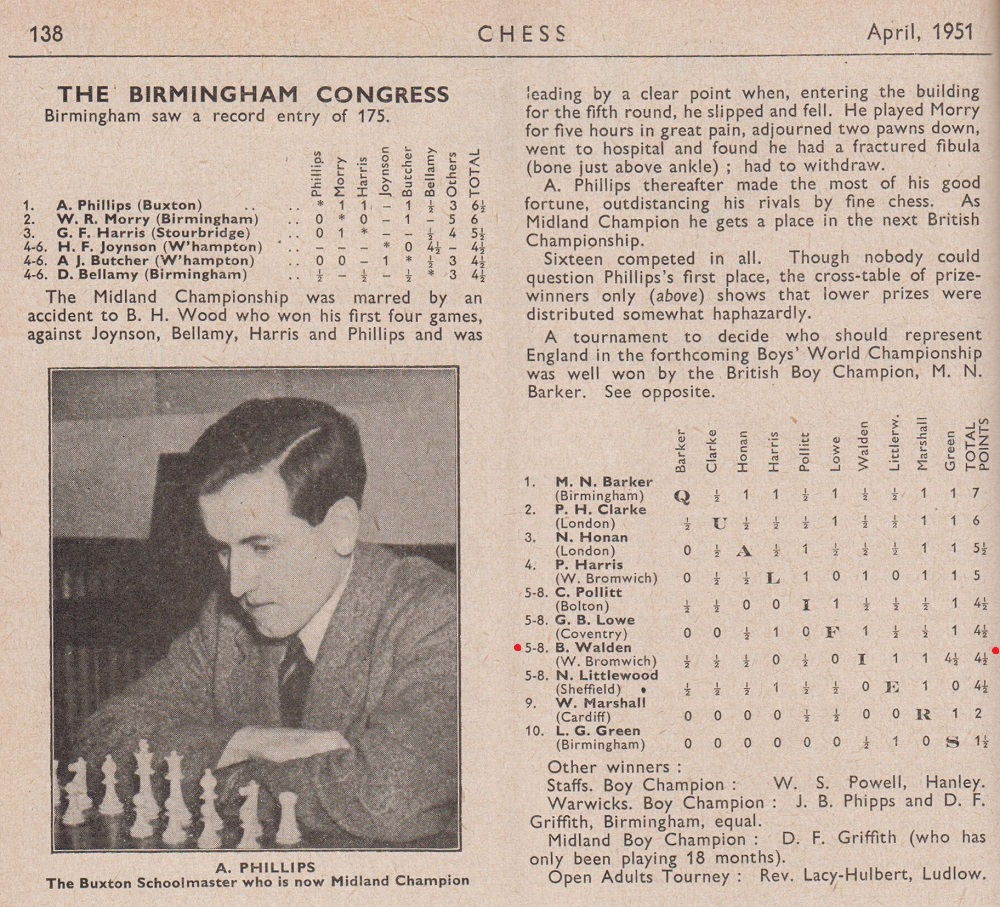
From CHESS, 9 February 1963, page 138:
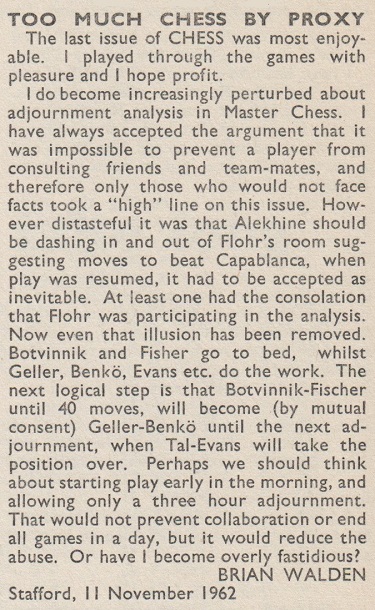
Walden wrote the Introduction to Chess. Master the moves by Leonard Barden (London, 1977):
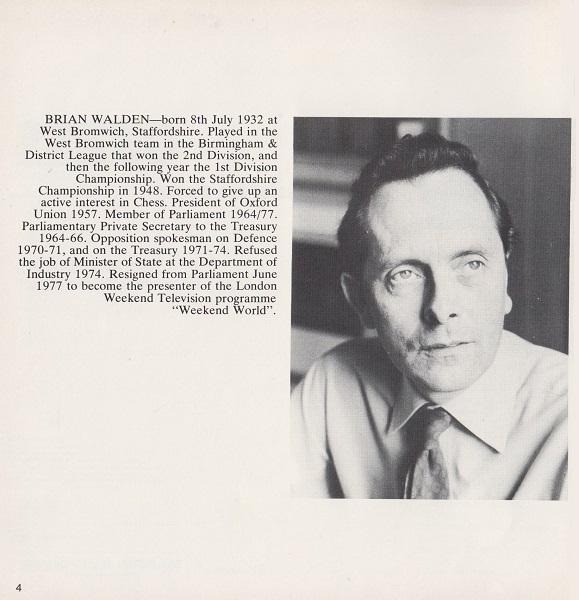
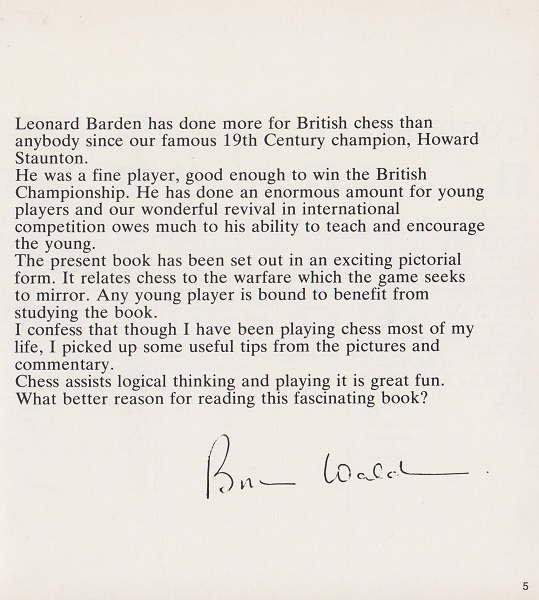
Below is an extract from a profile of Brian Walden by Joan Bakewell on pages 55-56 of the Illustrated London News, 1 October 1977:
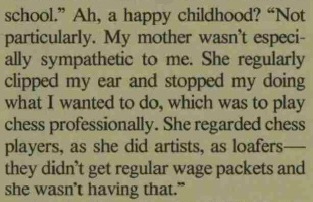
A report on pages 9-11 of the January 1920 BCM:
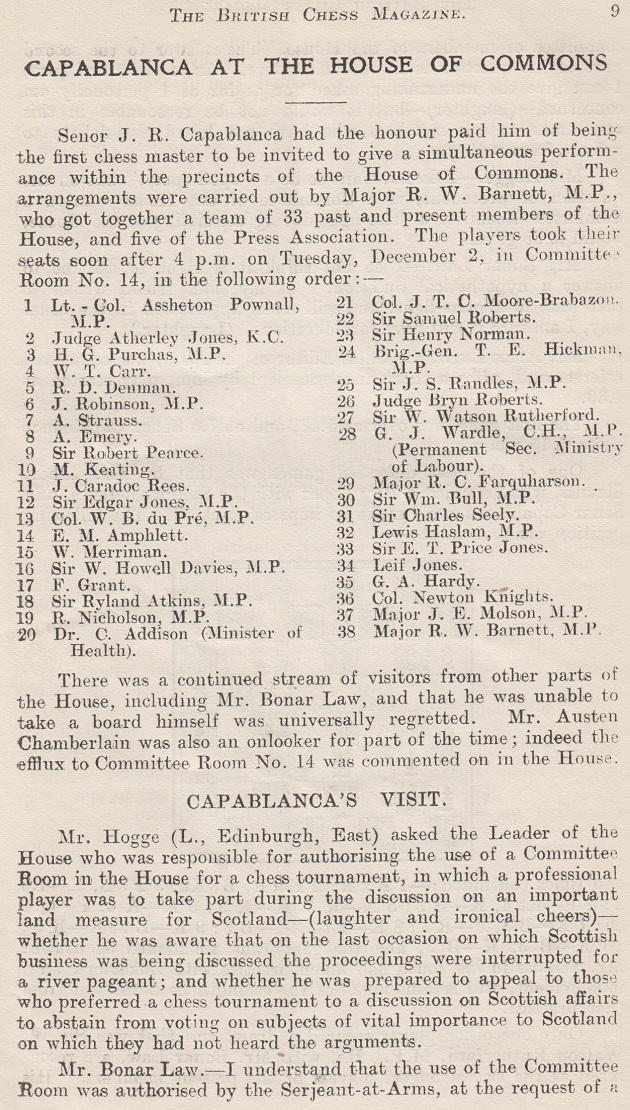
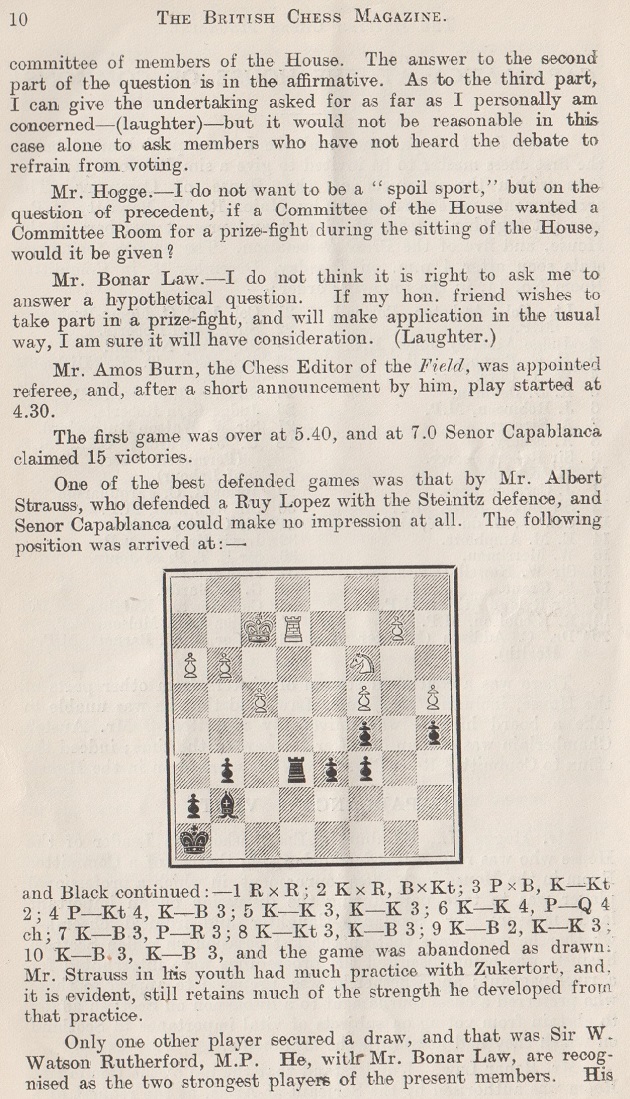
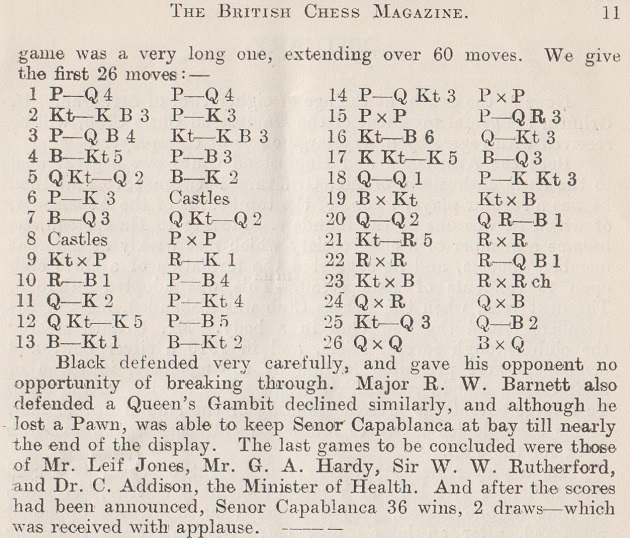
In showing the conclusion of Capablanca’s game against Albert Strauss on page 10, the BCM commented, ‘Mr Strauss in his youth had much practice with Zukertort’.
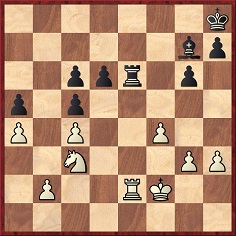
1...Rxe2+ 2 Kxe2 Bxc3 3 bxc3 Kg7 4 g4 Kf6 5 Ke3 Ke6 6 Ke4 d5+ 7 Kf3 h6 8 Kg3 Kf6 9 Kf2 Ke6 10 Kf3 Kf6 Drawn.
Databases and ‘complete games’ books often disregard such fragments.
See too C.N. 11682, which included the following:
A grievance was expressed by James Myles Hogge (1873-1928), the Liberal MP for Edinburgh East.
The Hansard record shows that the BCM gave only an abridged account of the exchanges between Hogge and the Leader of the House, Andrew Bonar Law.
Reproduced with authorization:
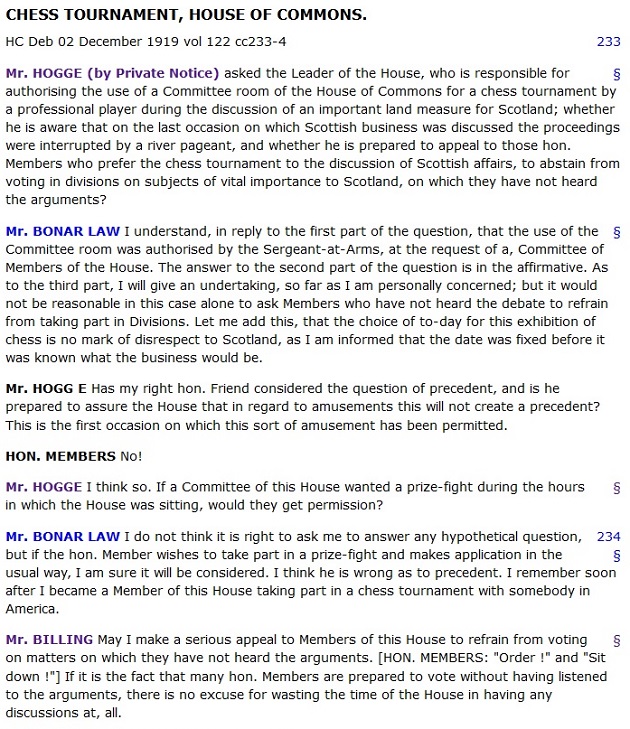
The score-sheet of Capablanca’s game against Judge Bryn Roberts (1843-1931) in his House of Commons display on 2 December 1919 (C.N. 11626) has been found by Olimpiu G. Urcan (Singapore). The source is the John Bryn Roberts Collection (GB 0210 JBROBERTS, item no. 924, ISYSARCHB34) at the National Library of Wales.
Readers are offered a tough deciphering challenge:
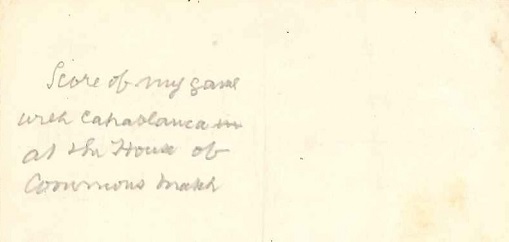

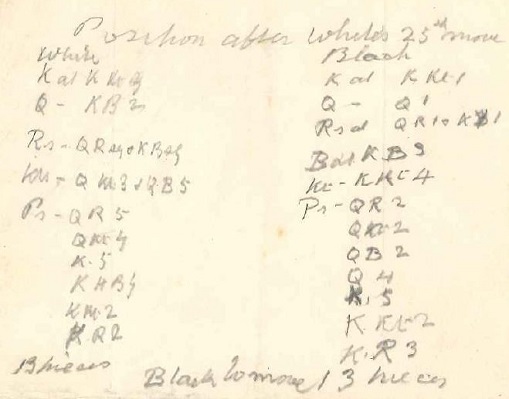
Gerald Abrahams discussed Andrew Bonar Law, William Watson Rutherford, John Simon and Richard Barnett on pages 37-38 of Not Only Chess (London, 1974):
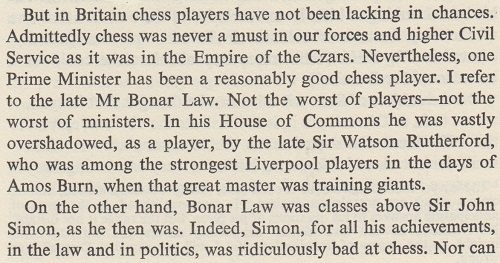
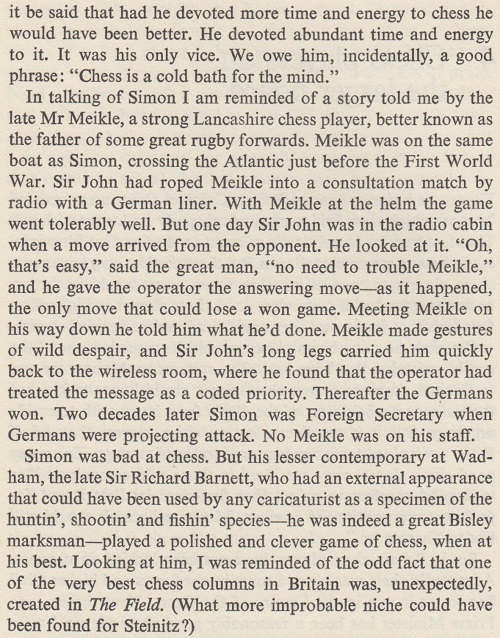
The Hansard website yields hundreds of references to chess in the proceedings of the House of Commons and the House of Lords, and one brief exchange is reproduced here as an example, from Questions to the Prime Minister (Tony Blair) on 28 April 1999:
‘Charlotte Atkins (Staffordshire, Moorlands)
Will the Prime Minister congratulate our young United Kingdom chess players, who have won so many world titles and records recently? Does he agree that the best way of making the United Kingdom the top chess nation in the world is to recognise chess as a sport, and to end the discrimination of United Kingdom chess players, who suffer from lack of training facilities, lack of finance and very little organisation of chess games in schools? Is it not time that we joined the 100-plus nations of the world that already recognise chess as a sport and fund it accordingly?
The Prime Minister
It is at a moment like this that I look along the Front Bench in search of inspiration, but do not find any. [Interruption.] Yes, I have just located the inspiration, but, unfortunately, she is rather far away from me. My hon. Friend’s comments sound thoroughly persuasive. Perhaps the safest thing for me to say is that I shall make further inquiries and write to her.’
Charlotte Atkins, who was the Labour MP for Staffordshire, Moorlands from 1997 to 2010, informs us that there was no follow-up action by the Prime Minister, but that the then Minister for Sport, Tony Banks (1942-2006), pressed the case for chess to be recognized as a sport. However, he occupied that post only until July 1999.
We shall be glad to hear from readers who find notable chess references in Hansard, or in other countries’ parliamentary transcripts.
(11693)
From our collection:

Tony Blair
A paragraph on page 239 of the Chess Amateur, May 1928:
‘Mr F. Kingsley Griffith, recently elected MP for Middlesbrough [‘Middlesborough’], is a notable addition to the chessplayers in the House of Commons. He has played for Kent in matches, when time permitted, giving promise of first-class strength.’
Regarding Leslie Burgin (1887-1945), see C.N.s 4327, 4979, 6714 and 7225.
See also the references to Lord Randolph Churchill and Charles Bradlaugh in a feature about Jack the Ripper in Chess Jottings.
To the Chess Notes main page.
To the Archives for other feature articles.
Copyright: Edward Winter. All rights reserved.